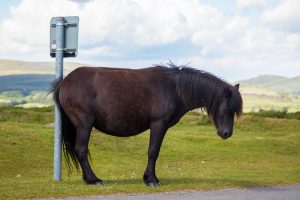
Why you should start now with treating sweet itch (summer itch)!
Better too early than too late. A very important saying when it comes to the treatment of sweet itch (summer itch). It is important to start the program of treatment against sweet itch early in spring, before the first midge has bitten, at the beginning of March. Why you should already start treatment against sweet itch?
The answer is simple; the temperature rises above 10 ℃ and at that point last winter’s midges or ‘no-see-ums’ eggs can hatch. This is why it is of great importance to ensure that the blood of your horse or pony is made unattractive right now, by means of a preventive dose of Finecto+ Horse (1-2 scoops per day). Because if you are too late it means that you will have to start with the curative dose, which is 6 scoops per day. This is why the principle with sweet itch is “better too early than too late!”
Treatment plan for sweet itch (summer itch)
Summer Itch is a persistent problem that horses and ponies probably never completely get rid of. This is why it is very important to give this irritation problem as little chance as possible. It is important to be very consistent during the course of treatment. We have listed the most important tips and trics for treating Summer Itch. The more measures you are able to apply, the less chance there is of itch from Summer Itch:
1. Start with Finecto+ Horse when it is 10 ℃
By mixing Finecto+ Horse through the feed you make the blood unattractive for ectoparasites, including the Culicoides biting midge. Research has shown that biting midges hate the herbs and essential oils in Finecto+ Horse. Starting the preventive dose before the first midge has bitten is of vital importance. You can find more information about Finecto+ Horse here.
2. Limit carbohydrates/fructan/sugars in the feed
Research has shown it can help to adjust your horse’s feed as a measure against sweet itch. This mainly involves concentrated feeds. Cold-blooded breeds of horses are more sensitive to sugars than crossbreed horses. Is your horse unable to do without concentrated feed? Then think about using a molasses and/or grain-free concentrate. They contain less sugar and starch. However, do pay attention to a supply of vitamins and minerals if you only use roughage as feed.
3. Keep horses stalled an hour prior to and after dawn and dusk
The bugs are most actively feeding around dawn and dusk. This is why stalling your horse in the stable before sunrise and sunset can help. There are more bugs in the meadow than in the stable. Therefore, this an additional measure and it is not sufficient on its own.
Conclusion: start sweet itch treatment right away. The sooner you start on a program of treatment and prevention the better off your horse will be. Definitely now that there will be nice weather this coming period. Be on time!




